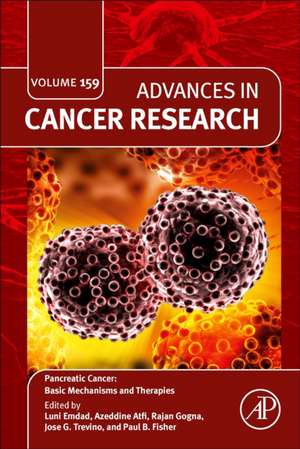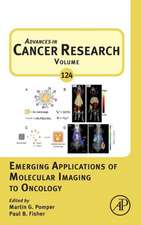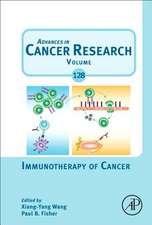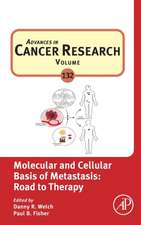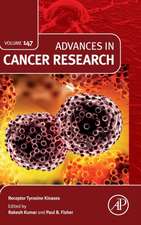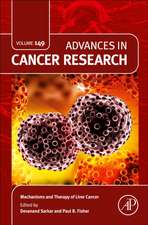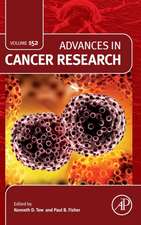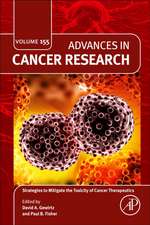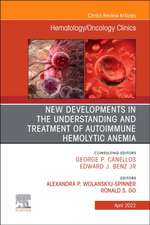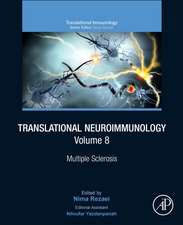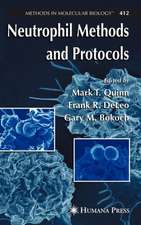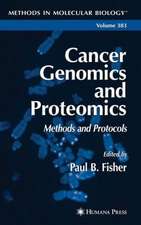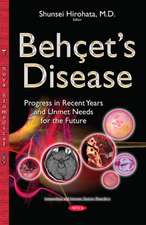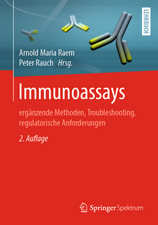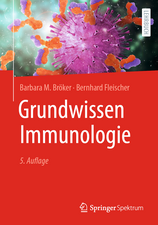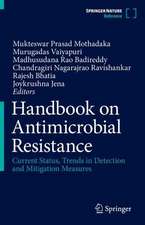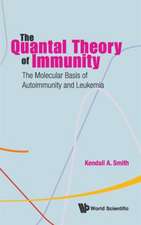Pancreatic Cancer: Basic Mechanisms and Therapies: Advances in Cancer Research, cartea 159
Luni Emdad, Azeddine Atfi, Rajan Gogna, Jose G Trevino, Paul B. Fisheren Limba Engleză Hardback – iun 2023
Pancreatic cancer (PC) is the third leading cause of cancer-related deaths in the United States. Greater than 90% PCs are Pancreatic ductal adenocarcinomas (PDAC) which have a dismal estimated 5-year overall survival of only 11%. PDAC is predicted to become the second leading cause of mortality in the United States by 2030. In the clinic, the PDAC patients often present with incurable disease at the time of first diagnosis. This cancer is particularly lethal because of its propensity to spread quickly to distant organs including the lymphatic system. PDAC metastasis occurs shortly after tumor initiation and is caused by a complex interaction between autonomous tumor cells and cellular elements of the tumor microenvironment. Although PDAC remains a challenging disease to treat and a leading cause of cancer-related deaths, progress is being made in disease etiology and pathogenesis, and intensive research is focused on developing optimal treatment approaches for patients. Considering the continuous progress being made in understanding PDAC pathogenesis and designing new therapies, it was considered timely to develop an up-to-date thematic issue of Advances in Cancer Research (ACR) focused on PDAC.
In this thematic issue, we have included ten review articles by experts that cover cancer disparities, PDAC pathobiology, the roles of the tumor microenvironment, tumor heterogeneity, PC stem cells, genetic and signaling events critical for PDAC pathogenesis, Immunotherapy and chemoresistance in PDAC, and different PDAC mouse models. This special issue highlights recent research progress in PDAC, which bridges the gap between basic and clinical research.
- The recent overview of Racial Disparities in Pancreatic Cancer Clinical Trials; Overview the evolution of in vivo models for PDAC
- Up-to-date discussion of diverse genetic and molecular signaling changes in PDAC; Role of tumor heterogeneity in therapy resistance in PDAC; Chemoresistance in PDAC and how to overcome this challenge; Current and emerging approaches and strategies for advancing targeted therapy and immunotherapy for PDAC
- New insights into the role of epithelial-to-mesenchymal transition, tumor microenvironment (TME) and interactions of TME with cancer stem cells in PDAC pathogenesis, progression and therapeutic resistance
Din seria Advances in Cancer Research
- 29%
 Preț: 672.35 lei
Preț: 672.35 lei - 32%
 Preț: 689.90 lei
Preț: 689.90 lei - 32%
 Preț: 693.00 lei
Preț: 693.00 lei - 5%
 Preț: 1232.73 lei
Preț: 1232.73 lei - 32%
 Preț: 690.56 lei
Preț: 690.56 lei - 29%
 Preț: 724.16 lei
Preț: 724.16 lei - 29%
 Preț: 723.35 lei
Preț: 723.35 lei - 29%
 Preț: 721.04 lei
Preț: 721.04 lei - 9%
 Preț: 692.32 lei
Preț: 692.32 lei - 5%
 Preț: 722.30 lei
Preț: 722.30 lei - 5%
 Preț: 725.99 lei
Preț: 725.99 lei - 29%
 Preț: 723.61 lei
Preț: 723.61 lei - 29%
 Preț: 726.59 lei
Preț: 726.59 lei - 29%
 Preț: 723.54 lei
Preț: 723.54 lei - 18%
 Preț: 814.13 lei
Preț: 814.13 lei - 29%
 Preț: 725.98 lei
Preț: 725.98 lei - 29%
 Preț: 727.94 lei
Preț: 727.94 lei - 35%
 Preț: 732.96 lei
Preț: 732.96 lei - 25%
 Preț: 728.24 lei
Preț: 728.24 lei - 25%
 Preț: 727.70 lei
Preț: 727.70 lei - 19%
 Preț: 785.37 lei
Preț: 785.37 lei - 28%
 Preț: 696.45 lei
Preț: 696.45 lei - 28%
 Preț: 694.21 lei
Preț: 694.21 lei - 25%
 Preț: 724.48 lei
Preț: 724.48 lei - 28%
 Preț: 699.21 lei
Preț: 699.21 lei - 25%
 Preț: 725.81 lei
Preț: 725.81 lei - 25%
 Preț: 729.23 lei
Preț: 729.23 lei - 28%
 Preț: 700.09 lei
Preț: 700.09 lei - 28%
 Preț: 692.76 lei
Preț: 692.76 lei - 25%
 Preț: 723.21 lei
Preț: 723.21 lei
Preț: 729.53 lei
Preț vechi: 966.19 lei
-24% Nou
Puncte Express: 1094
Preț estimativ în valută:
139.61€ • 144.87$ • 116.69£
139.61€ • 144.87$ • 116.69£
Carte tipărită la comandă
Livrare economică 08-22 martie
Livrare express 11-15 februarie pentru 231.38 lei
Preluare comenzi: 021 569.72.76
Specificații
ISBN-13: 9780443133541
ISBN-10: 0443133549
Pagini: 390
Dimensiuni: 152 x 229 x 26 mm
Greutate: 0.77 kg
Editura: ELSEVIER SCIENCE
Seria Advances in Cancer Research
ISBN-10: 0443133549
Pagini: 390
Dimensiuni: 152 x 229 x 26 mm
Greutate: 0.77 kg
Editura: ELSEVIER SCIENCE
Seria Advances in Cancer Research
Public țintă
Basic, translational, and clinical pancreatic cancer researchers, pancreatic cancer oncologists, molecular biologists, and immunologists, postdoctoral fellows, residents and fellows, and PhD and MD/PhD graduate students pursuing basic and translational pancreatic cancer researchCuprins
1. Notch signaling pathway in pancreatic tumorigenesis
Keli Xu
2. EMT in Pancreatic Ductal Adenocarcinoma
Azeddine Atfi
3. Review of Immunocompetent In-vivo Models of PDAC OR Stromal Microenvironment Impact on Pacreatic Cancer Progression and Metastasis
Vignesh Vudatha and Jose Trevino
4. Interplay between MAP Kinases and tumor microenvironment: Opportunity for immunotherapy in pancreatic cancer
Ajay Rana and Kumar Sandeep
5. KRAS in pancreatic cancer: Emerging therapeutic strategies
Daohong Zhou
6. Disparities in Pancreatic Cancer Clinical Trials
Allison Neal Martin and Rebecca A. Snyder
7. Tumor heterogeneity: an oncogenic driver of PDAC progression and therapy resistance under stress conditions
Esha Madan
8. Oncogenic Signaling Pathways in Pancreatic Ductal Adenocarcinoma
Kedar Nath Natarajan
9. Chemoresistance in Pancreatic Ductal Adenocarcinoma: Overcoming Resistance to Therapy
Praveen Bhoopathi
10. Tumor microenvironment interactions with cancer stem cells in pancreatic ductal adenocarcinoma
Rajan Gogna
Keli Xu
2. EMT in Pancreatic Ductal Adenocarcinoma
Azeddine Atfi
3. Review of Immunocompetent In-vivo Models of PDAC OR Stromal Microenvironment Impact on Pacreatic Cancer Progression and Metastasis
Vignesh Vudatha and Jose Trevino
4. Interplay between MAP Kinases and tumor microenvironment: Opportunity for immunotherapy in pancreatic cancer
Ajay Rana and Kumar Sandeep
5. KRAS in pancreatic cancer: Emerging therapeutic strategies
Daohong Zhou
6. Disparities in Pancreatic Cancer Clinical Trials
Allison Neal Martin and Rebecca A. Snyder
7. Tumor heterogeneity: an oncogenic driver of PDAC progression and therapy resistance under stress conditions
Esha Madan
8. Oncogenic Signaling Pathways in Pancreatic Ductal Adenocarcinoma
Kedar Nath Natarajan
9. Chemoresistance in Pancreatic Ductal Adenocarcinoma: Overcoming Resistance to Therapy
Praveen Bhoopathi
10. Tumor microenvironment interactions with cancer stem cells in pancreatic ductal adenocarcinoma
Rajan Gogna
